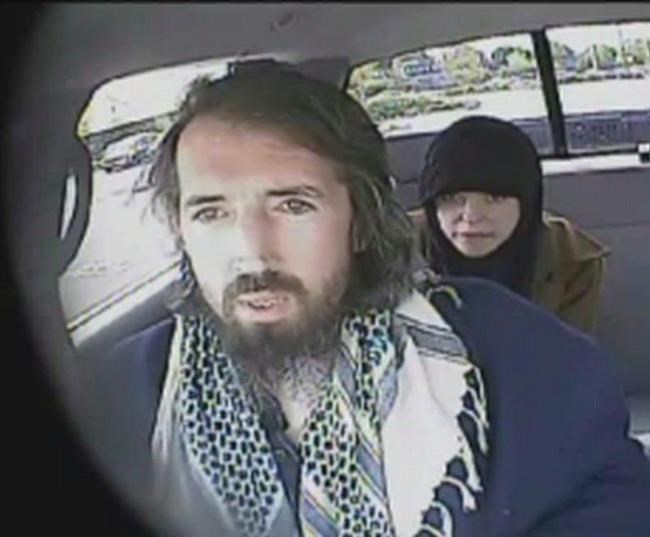
John Nuttall and Amanda Korody are shown in a still image taken from RCMP undercover video. THE CANADIAN PRESS/HO-RCMP
July 28, 2016 - 1:00 AM
VANCOUVER - John Nuttall hangs his head and promises he'll do better next time. Covert video played in British Columbia Supreme Court from the spring of 2013 shows the man Nuttall calls his Muslim brother berating him for pitching a poorly researched terrorism plot to hijack a commuter train on Vancouver Island.
The problem: passenger service on the Via Rail line had been discontinued years earlier.
The video is part of the evidence heard by Justice Catherine Bruce, who is due to decide Friday whether the Mounties induced Nuttall and Amanda Korody, his common-law wife, to commit terrorist acts.
Nuttall's plans for the train were caught on police surveillance video.
"It was just an idea I came up with off the top my head ... as I was sitting in the truck," Nuttall explains, averting his eyes. The methadone-dependent former drug addict, who lived on welfare with Korody in a Vancouver-area basement suite, typed up the plan several days before at the brother's insistence.
"This thing has to be prepared. It has to be researched," says the police officer posing as an Arab businessman and Muslim extremist.
Nuttall becomes more animated as he promises to do better, offering more ideas on top of others he had proposed, including hijacking a nuclear submarine, breaking Omar Khadr out of prison in Guantanamo Bay, and storming a Vancouver Island military base using AK47s and "Teflon-coated" bullets.
"I'm here to make what you have in your head become true, what you want in your heart to be reality," says the undercover RCMP officer, who is part of an elaborate sting operation.
On Canada Day of 2013, Nuttall and Korody were arrested and charged with multiple terrorism-related offences after planting what they believed were pressure-cooker bombs on the B.C. legislature grounds in an effort to kill as many people as possible.
A jury found the pair guilty, but their conviction wasn't recorded while lawyers argued whether police manipulated the couple into committing the crime. If Bruce rules they were not entrapped, then the pair's guilt will be registered and a date will be set for their sentencing hearing. If she decides they were entrapped, a stay of proceedings will be issued and Nuttall and Korody walk free.
The case sets two competing versions of the same story against one another.
In the narrative presented by defence lawyers, the RCMP acted on unreasonable suspicions to exploit two vulnerable people, herding them towards a manufactured crime that was planned, prepared and all but carried out by the police.
Nuttall's lawyers said substance abuse and mental health played a role and that was highlighted in one video clip played at the trial where Nuttall encourages Korody to wilfully forget the name of their new friend — the undercover officer — so as not to endanger him should they be captured and tortured for information.
The Crown argues that the Mounties acted on reports about a man openly espousing views and plans to commit violent jihad, or holy war. They say police went undercover to gauge Nuttall's seriousness, before gently guiding him towards one of the many plans he had proposed but which would pose the lowest threat to the public.
Crown counsel insisted undercover officers offered Nuttall and Korody numerous opportunities to abandon their plans.
In a telephone interview, Crown attorney Peter Eccles acknowledged Bruce faces a difficult decision that pits public safety against the acceptability of police tactics.
"The tension is between society's expectation that we are going to be kept safe from (lone-wolf terrorists), and the reality that doing so, taking the investigative steps to ensure these individuals don't act on their fantasies of violence and visions of hate and murder, is problematic," he said.
"Restrictions on the police's ability to investigate these things are necessary to some extent. But we also don't want to gut their ability to deal with (the threat)."
Lawyer Marilyn Sandford, who represents Nuttall, said a finding of entrapment in such a serious case would be highly unusual, but it could have repercussions for how police conduct undercover operations.
If the arguments from Nuttall and Korody's lawyers hold sway, this will be the first terrorism case to end in entrapment in North America, said Kent Roach, a University of Toronto law professor and anti-terrorism expert.
— Follow @gwomand on Twitter
News from © The Canadian Press, 2016